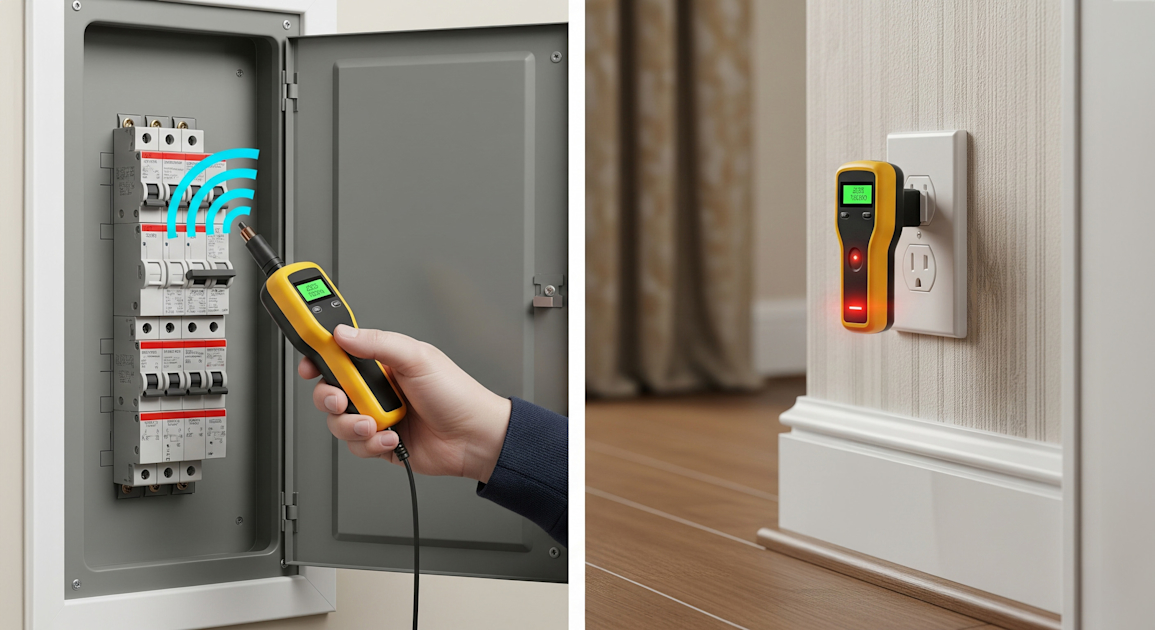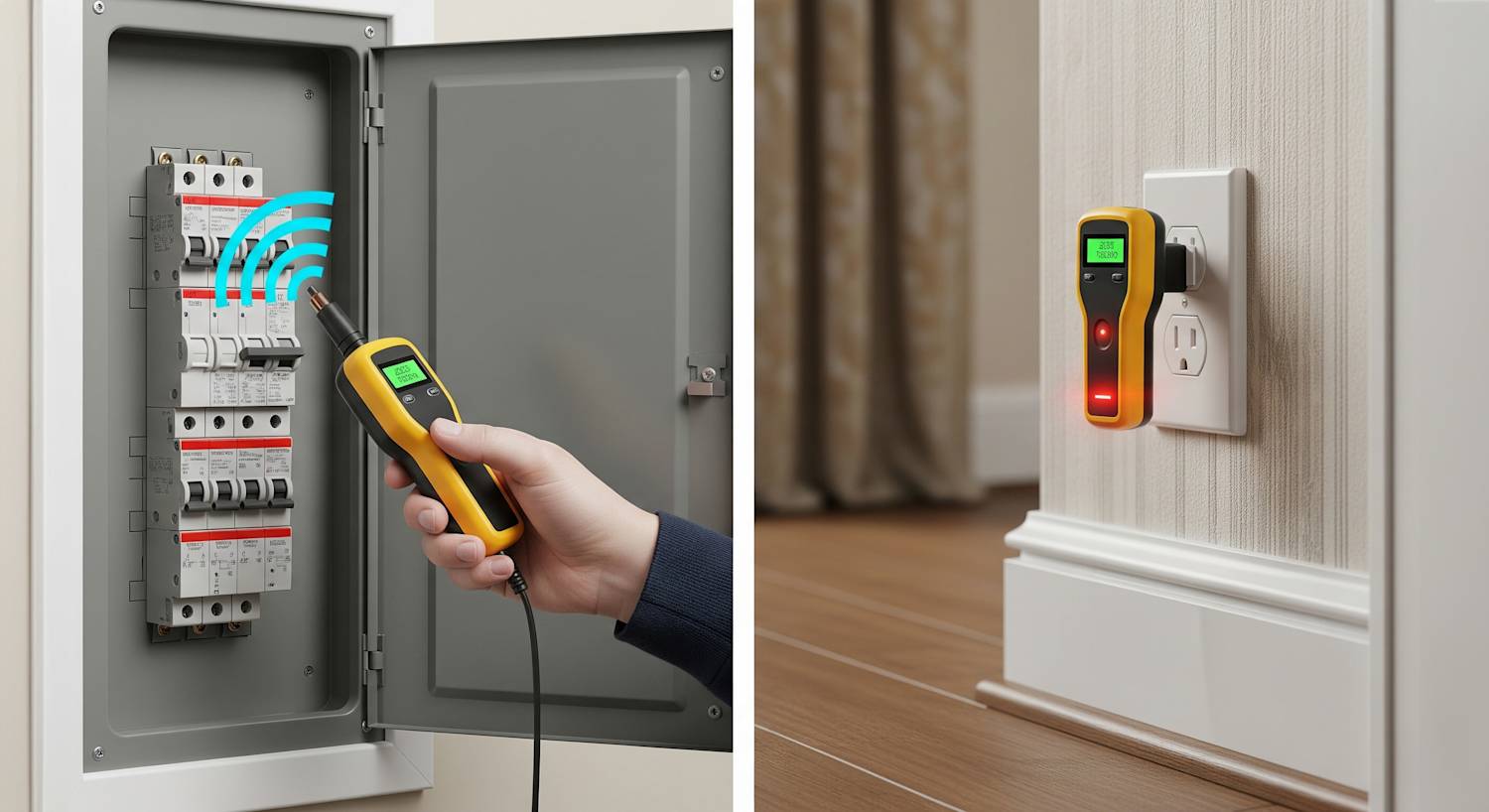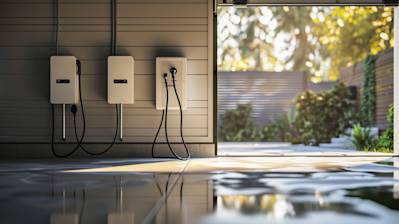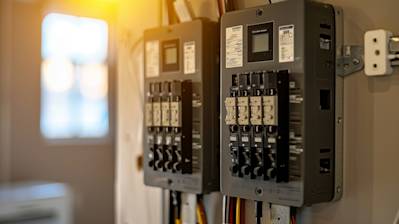When dealing with the electrical system in your home or office, it's crucial to have the right tools. One such essential tool is the circuit breaker finder, an innovative device that helps you detect which breakers are connected to specific outlets. In this guide, we'll delve deep into the importance and usage of circuit breakers, providing a wealth of detailed information about this essential tool.
What is a Circuit Breaker Finder?
A circuit breaker finder is an advanced tool primarily used by professionals to identify the exact circuit breaker that corresponds to an electrical outlet. These easy-to-use devices use a transmitter and a receiver to locate and identify the right circuit breaker.
The Mechanism of Circuit Breaker Finders
Unravel the complex workings of a circuit breaker finder. To understand how they work, first, you must know their essential components- a transmitter and a receiver.
The Transmitter
The transmitter creates a unique signal that is sent through the electrical system when plugged into an outlet.
The Receiver
A receiver is then used to detect this signal over the breaker panel. Once the receiver identifies the signal over a specific breaker, it points out the exact breaker wired to the chosen outlet.
Why is a Circuit Breaker Finder Essential?
Below are a few reasons why circuit breaker finders are valuable tools.
Safety: They provide an extra level of safety by preventing unnecessary electrical sparks or accidents.
Convenience: Locating the correct circuit breaker can be time-consuming, especially in larger buildings. A circuit breaker finder makes this job more manageable in less time.
Precision: It eliminates guesswork and allows you to find the exact circuit breaker linked to an outlet quickly.
Hierarchy of Circuit Breakers
So, you might be wondering, 'How does a circuit breaker fall into an electrical system?'. Here's a tree structure.
- Electrical Services
- Service Cables
- Circuit Breakers
- Sub-Circuits
- Devices or Appliances
- Sub-Circuits
- Circuit Breakers
- Service Cables
Different Types of Circuit Breaker Finders
There exist several types of circuit breaker finders, each designed to meet specific needs. Here, we will discuss three main types:
Digital Circuit Breaker Finders: Use digital technology for locating circuit breakers. These devices offer more precision and ease of use.
Non-contact Circuit Breaker Finders: Non-contact varieties are equipped with sensory technology. They can detect an electrical signal without making direct contact.
Circuit Breaker Finder with Accessories: Some finders come with additional accessories like a GFCI tester or a flashlight, providing an all-in-one solution for electrical testing needs.
How to Use a Circuit Breaker Finder
Learning to use a circuit breaker finder is uncomplicated. Here is a step-by-step guide on how to get it done:
Plugin the Transmitter: The first step is to plug the transmitter into an electrical outlet. The transmitter sends an electrical signal down the line.
Initialize the Receiver: Switch on the receiver and bring it close to the breaker panel.
Locate the Circuit Breaker: Run the receiver over the breaker panel. Once the receiver identifies the correct circuit breaker, it reacts - via a light, sound, or vibration.
Confirm the Circuit Breaker: To confirm, switch off the identified circuit breaker. If the transmitter's signal ceases, you've found the correct breaker.
Final Thoughts on Circuit Breaker Finders
Circuit breaker finders are a must-have for anyone involved in electrical maintenance and repair tasks. They offer a safer, more convenient, and accurate method for locating the precise circuit breaker linked to an outlet. Whether you are a homeowner troubleshooting your electrical system or a professional electrician, a circuit breaker finder is an essential addition to your toolset.
Frequently Asked Questions about Circuit Breaker Finder
Why Do I Need a Circuit Breaker Finder?
If you've ever needed to replace a circuit breaker or needed to do some electrical work in your home or business, then you know how important it is to accurately identify which circuit breaker corresponds to which electrical circuit. A circuit breaker finder enables you to quickly and accurately find the specific breaker powering a plug or light fixture, which drastically reduces the time spent on the job and increases the safety and efficiency of your work.
How Accurate is a Circuit Breaker Finder?
The accuracy of a circuit breaker finder may vary depending on the brand and model, but generally, they are quite accurate. Some high-quality circuit breaker finders can even identify the correct breaker on the first try most of the time. It's essential to always follow the manufacturer instructions and double-check to ensure the correct circuit breaker has been found to avoid any potential electrical issues.
Can a Circuit Breaker Finder Be Used on a Live Circuit?
Yes and no. While some circuit breaker finders can be used on live circuits, others cannot. Always ensure you read the user manual before using your device. Keep in mind that it's safer to turn off the main breaker when working on electrical systems in your house.
How Far Can a Circuit Breaker Finder Trace a Circuit?
A circuit breaker finder can typically trace a circuit for several hundred feet. However, the range may be affected by the type and thickness of the walls or any large metal objects that could interfere with the signal.
Does a Circuit Breaker Finder Require a Battery?
Most circuit breaker finders require a battery for the transmitter, with many using a standard 9-volt battery. Always ensure you have spare batteries on hand in case the battery in your device becomes depleted during use.
How Do I Use a Circuit Breaker Finder on a Light Circuit?
Operating a circuit breaker finder on a light circuit may require an accessory known as a light bulb adapter. This adapter allows you to send a signal from the light fixture, which can then be traced back to the circuit breaker.
What Other Features May a Circuit Breaker Finder Have?
Some circuit breaker finders come with additional features like visual or audio indicators to help you identify the correct breaker. Others may come with a built-in GFCI tester, or the ability to differentiate between parallel circuits. Some models may even have a feature known as a 'search mode' that can help locate breakers or fuses without power.
Is a Circuit Breaker Finder Safe to Use?
Yes, a circuit breaker finder is safe to use provided you follow the manufacturer's directions. You should not try to use the device for any function beyond its intended purpose and should always adhere to all safety protocols when working with electricity.
Pros of Circuit Breaker Finders
Accurate Identification of Circuit Breakers
Circuit breaker finders stand out for their capacity to accurately identify individual breakers. With it, electricians and individuals can quickly identify which circuit breaker corresponds to which outlet. This helps to save time typically wasted on trial and error methods, such as turning off breakers randomly to find the right one.
Enhances Safety
Circuit breaker finders contribute significantly to safety. If appropriately utilized, a circuit breaker finder can prevent electrical shocks and potential electrical fires. You don't need to come into physical contact with any wires during the identification process. Thus, it's a vital tool for any electrician looking to maintain a high safety standard.
User-friendly
Most circuit breaker finders are easy to use. You don't need extensive knowledge of electrical systems to operate one. Typically, it involves plugging a transmitter into an outlet and utilizing a receiver to find the corresponding breaker. Some devices even come with visual or audio signals to make the process even easier.
Time and Labor Efficient
Using a circuit breaker finder can save a lot of time and labor. Compared to the traditional method of manually testing each circuit breaker to find the right one, a finder can help you identify the desired breaker in seconds. This conveys substantial benefits for professionals who often work with electrical systems, as it can help drastically increase productivity.
Variety of Models
There are a variety of circuit breaker finders available in the market, each having different features and capacities. This allows for flexibility in terms of choosing a model that suits your specific needs or preferences. You can find models with different signal ranges, additional features like GFCI testing, and different price ranges that suit different budgets.
Cons of Circuit Breaker Finders
Sometimes Susceptible to Errors
While circuit breaker finders are known for their accuracy, they can sometimes make errors. These devices can occasionally give false positives or negatives, which can be confusing and time-consuming to sort out. Factors such as poor calibration, interference from other electrical devices, and the simple complexity of electrical systems can contribute to these occasional inaccuracies.
Can be Pricey
While there are budget models available, some circuit breaker finders can be quite expensive. The higher-end models with more features and greater durability typically come with a higher price tag. Therefore, they might not be as affordable for occasional users or DIY enthusiasts when compared to professionals who use them almost daily.
Requires Standard Outlets
Most circuit breaker finders require you to plug a transmitter into a standard outlet. Therefore, they might not work in older buildings with non-standard outlets or in situations where you are trying to track a circuit that does not end in a standard outlet.
Limited Range
Some circuit breaker finders might not have a sufficiently wide range, depending upon their signal strength. If you are working in a large building or dealing with circuits that are far away from their corresponding outlets, the finder might not be able to correctly identify the breaker.
Durability Concerns
While most circuit breaker finders are designed to be sturdy, durability can be a concern for some models. Lower-end models may not be as durable and could fail after a few uses. Therefore, you might have to incur additional costs for their replacement or repair.
Dependence on Batteries
Most circuit breaker finders are powered by batteries. Though this aids their portability, it also means you need to have spare batteries on hand or deal with recharging. Batteries ultimately drain, and if you find your batteries drained during work, it could slow you down.
Myths and Misconceptions about Circuit Breaker Finders
From DIY homeowners to seasoned electricians, a wide range of people depend on circuit breaker finders to assist in identifying which circuit breaker corresponds to which area of electrical circuits. However, along with this high usage, there are various myths and misconceptions surrounding these handy gadgets. Here, we aim to dispel some of the most common of these misconceptions.
Misconception #1: A Circuit Breaker Finder Functions Like a Magic Wand
All Circuit Breaker Finders are Always 100% Accurate
This couldn't be further from the truth. While circuit breaker finders are primarily designed to identify the specific breaker associated with an outlet or switch, they are not 100% accurate in every case. Numerous variables could affect their accuracy, such as the quality of the electrical wiring and interference from other circuits within close proximity.
Misconception #2: All Circuit Breaker Finders are Universal
Any Circuit Breaker Finder can Work on Any Electrical Panel
Contrary to this popular notion, not all circuit breaker finders are designed to operate across all types of electrical panels. Some may well function efficiently on most panels, but others may exhibit limitations when it comes to specific types or models of panels. Therefore, it's crucial to ensure the compatibility of the circuit breaker finder with your electrical panel before purchase and usage.
Misconception #3: Circuit Breaker Finders are Expensive
Only Professionals can Afford Circuit Breaker Finders
This is another widespread misconception that circuit breaker finders are pricey and only meant for professionals. While high-end models with advanced features can carry a higher price tag, basic models can be quite affordable. With a modest budget, DIY enthusiasts and homeowners can invest in a decent circuit breaker finder to assist with their electrical troubleshooting.
Misconception #4: Circuit Breaker Finders are Difficult to Use
They Require Extensive Electrical Knowledge
It's a common belief among many people that using a circuit breaker finder is complex and necessitates a high level of electrical knowledge. However, most of these tools are fairly user friendly and usually come with easy-to-follow instructions that make them straightforward to navigate for anyone, even those with minimal technical know-how.
Misconception #5: Circuit Breaker Finders Always Need Batteries to Function
They are Inefficient Due to Constant Battery Usage
While it's true that many circuit breaker finders do need batteries to operate, not all models do. This misconception probably comes from the prominent models which typically require the use of batteries. Additionally, several of these battery-operated models are designed with power efficiency in mind, and do not burn through batteries as quickly as one might expect.
Misconception #6: Circuit Breaker Finders Can Cause Electrical Shocks
They are Hazardous for Home Use
Circuit breaker finders are commonly viewed as risky, particularly in the hands of newbies who fear they can cause electrical shocks. This is largely untrue. Most circuit breaker finders are designed with a high level of safety and are well insulated to protect the user from shocks. However, like any other tool, they should be used carefully and in accordance with the manufacturer's guidelines.
In conclusion, while circuit breaker finders indeed play a critical role in making identification of circuits quicker and less complicated, they are often misunderstood. Therefore, it's essential to have right understanding and expectations when using these indispensable tools.
Summary
So, you've got a look at the mighty tool, the "circuit breaker finder". It's more than just a convenience, it's a necessity for homeowners, electricians, or anyone dealing with a complex network of wires and circuits. This tool takes the hazard and guesswork out of pinpointing the right breaker, making it a job that can be tackled with a push of a button.
As a tool that enhances safety and efficiency, a circuit breaker finder is truly invaluable. It not only saves you time figuring out which breaker operates what but also helps to minimize the risk of electrical shocks during maintenance work. Plus, they're compact and easy to use. A real no-brainer for any DIY project involving electricity.
Think about it, a circuit breaker finder can be a lifesaver (literally), especially in older homes where the electrical system may be a nest of mysteries. With one of these in your tool kit, you don't have to worry about accidentally shutting off the wrong breaker and disrupting power to critical appliances. It's all about convenience and staying safe. And that's something we can all plug into.
About Sagan Electric
Sagan Electric is your friendly neighborhood electric company based right in the heart of Sacramento, CA. With years of experience under our belts, we've been lighting up the people of Sacramento's lives (literally!) longer than you might think. From small households to big commercial projects, our team of dedicated and skilled electricians handle it all. In the world of wiring, we're wizards; in the realm of circuits, we're conquerors. But don't let all the electricity scare you, we're down-to-earth folks who love to chat, especially if it's about making your lights brighter and your bills lighter. So hey, whenever you're stuck in the dark, just remember, Sagan Electric is here to spark light into your life!
Tags: electrical, troubleshooting, home improvement,








